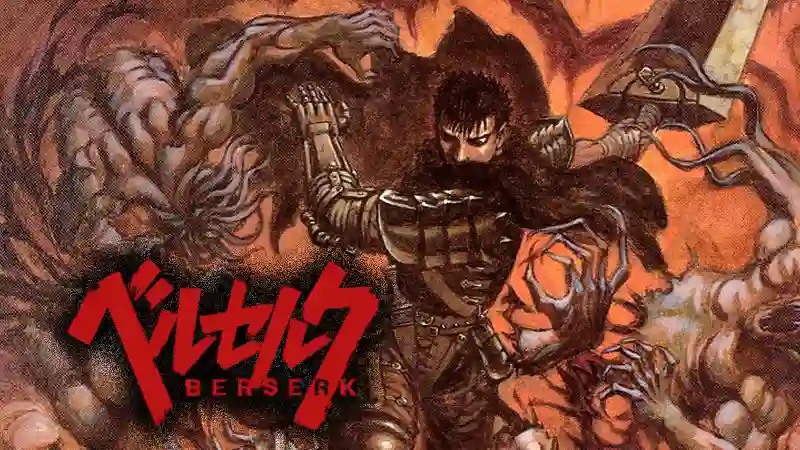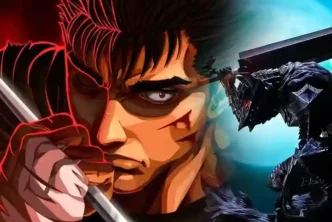At the heart of Kentaro Miura’s magnum opus, Berserk, lies a haunting melody—a symphony of despair that echoes through the dark and treacherous landscapes of Midland. Within this symphony, the themes of isolation and loneliness resonate as powerful motifs, weaving a narrative that transcends the boundaries of traditional dark fantasy. In this exploration, we delve into the melancholic undertones of Berserk, examining how Miura masterfully depicts the profound impact of isolation and loneliness on the characters within the series.
Guts’ Solitary Odyssey:
The protagonist of Berserk, Guts, epitomizes the profound isolation that permeates the series. From a traumatic childhood marked by abandonment and violence to his solitary odyssey as the Black Swordsman, Guts’ journey is one of relentless struggle against both human and supernatural adversaries. His path is one of perpetual loneliness, as he grapples with the weight of his cursed fate and the demonic entities that haunt him.
Guts’ isolation is not merely physical; it is a soul-deep solitude that manifests in his interactions with others. His struggles with trust, intimacy, and the fear of losing those close to him create a thematic resonance that explores the depths of human isolation amidst the chaos of Midland.
The Eclipse: A Confluence of Desolation:
The Eclipse, a pivotal event in Berserk, serves as the apex of isolation and despair. The brutal betrayal during this cataclysmic event shatters the bonds of camaraderie, leaving Guts and his lover, Caska, as the sole survivors amidst a sea of demonic entities. The isolation that follows becomes a nightmarish descent into the abyss, as Guts is marked by the Brand of Sacrifice and haunted by vengeful spirits.
Miura’s depiction of the Eclipse is a masterstroke in portraying the emotional and psychological toll of isolation. The event transforms Guts into the Black Swordsman—a lone wolf on a quest for vengeance, forever marked by the traumatic solitude of the Eclipse.
Caska’s Struggle with Fragmented Identity:
Caska, another central character in Berserk, undergoes a harrowing journey that encapsulates the theme of isolation. The trauma she experiences during the Eclipse leaves her with a fragmented identity, struggling with amnesia and the weight of unspeakable horrors. Her isolation becomes a poignant exploration of the fragility of the human psyche in the face of overwhelming despair.
Caska’s journey through fragmented memories and the subsequent isolation from those who care for her creates a narrative thread that resonates with the profound loneliness experienced by victims of trauma. Miura navigates the complexities of Caska’s isolation, intertwining her struggles with identity and connection to further amplify the overarching theme.
Griffith’s Ambition and Alienation:
Griffith, the charismatic leader of the Band of the Hawk, embarks on a path driven by ambition and the pursuit of a dream. However, his relentless pursuit of greatness leads him down a road of moral compromise, culminating in the Eclipse and his transformation into the God Hand Femto. Griffith’s ambition, while elevating him to a god-like status, isolates him from the very humanity he once embraced.
Miura’s portrayal of Griffith’s ambition as a double-edged sword explores the isolating consequences of unbridled aspirations. The once-charismatic leader becomes an embodiment of loneliness, forever separated from the mortal realm by the choices he made in the pursuit of his dreams.
The Loneliness of Apostles and Supernatural Entities:
Berserk doesn’t limit the exploration of isolation to its mortal characters. The series delves into the loneliness of apostles—humans transformed into demonic entities in exchange for their desires. The grotesque transformation and the existential isolation that follows create a thematic undercurrent, portraying the cost of succumbing to supernatural forces.
The God Hand, the enigmatic beings governing the demonic realm, epitomize a cosmic loneliness beyond mortal comprehension. Their existence as detached overseers of fate and causality further underscores the isolating consequences of wielding supernatural power within the narrative.
The Haunting Specter of Isolation:
Throughout Berserk, the haunting specter of isolation extends beyond individual characters to become a pervasive force within the world of Midland. The societal isolation faced by those branded with the sacrificial mark, the dehumanizing effects of war, and the desolation of the landscape itself contribute to the atmospheric loneliness that envelops the narrative.
Miura’s evocative world-building ensures that isolation is not confined to the personal struggles of characters but becomes an omnipresent force that shapes the very fabric of Midland. The desolate landscapes, decaying castles, and the existential solitude of the supernatural entities coalesce to create an atmospheric loneliness that lingers long after the pages are turned.
Conclusion:
Berserk’s exploration of isolation and loneliness is not a mere narrative device but an intricately woven tapestry that reflects the depths of the human experience. Kentaro Miura’s ability to convey the emotional weight of solitude, the existential despair of fragmented identities, and the cosmic loneliness that transcends mortal realms elevates Berserk beyond the confines of traditional dark fantasy.
The haunting melody of isolation that echoes through the pages of Berserk is not a dirge but an ode—an ode to the resilience of the human spirit in the face of overwhelming darkness. As readers traverse the desolate landscapes alongside Guts, Caska, and the denizens of Midland, they bear witness to a narrative that transcends genres to become a poignant exploration of the profound solitude that defines the human condition.





